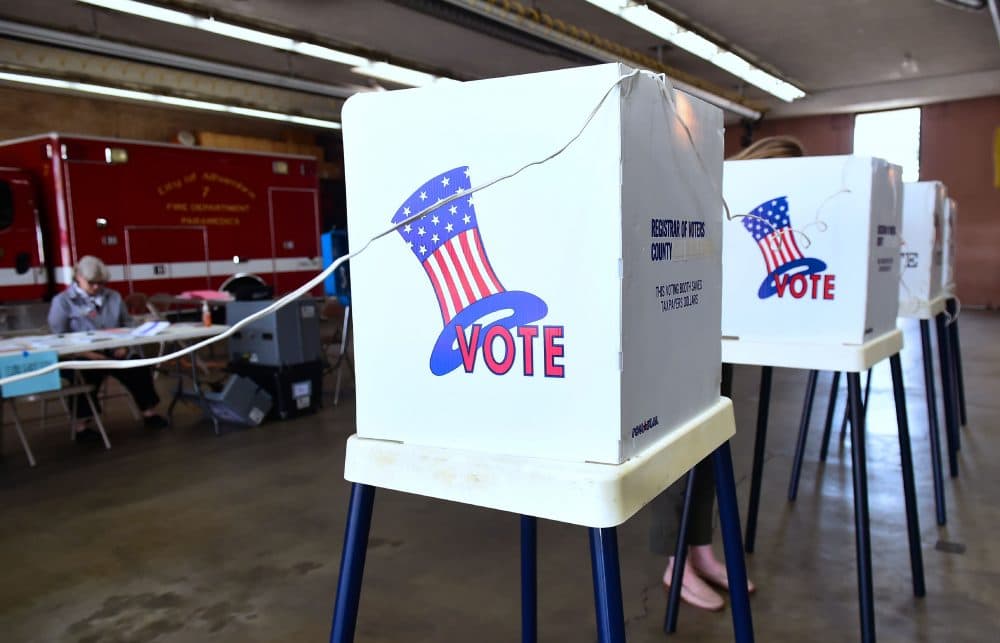Advertisement
How And Why Russia Interferes In Elections

This is part 1 of a two-part conversation. You can hear part 2 here.
Russia is continuing to interfere in U.S. elections, former FBI agent Clint Watts says.
Here & Now's Robin Young talks with Watts (@selectedwisdom), a cybersecurity analyst with the Foreign Policy Research Institute and author of the book "Messing with the Enemy," about strategies Russia employed to interfere in the 2016 election and what Russia hopes to achieve.
"It's not just to win an election," Watts says. "It is to demoralize, subvert the U.S. population and have an erosion of democratic institutions, and not be sure what to believe, what is fact or fiction. And we've seen that play out in a really devastating way over the last week and really over the last year."
Interview Highlights
On his Senate testimony on Russian election interference last year, and his thoughts on President Trump saying he didn't think Russia was still interfering in U.S. elections
"One of the things that I said during the testimony is, part of the reason active measures, the Russian influence, ever works is because Americans use it against their opponents. And I think that was a classic example last week of that continued pattern, where the president essentially appeared to take the side of Vladimir Putin, rather than his own intelligence community. And that really is the goal of the Russian influence effort."
"They love things like 'America first,' because if everybody puts themselves first instead of their alliances first, that allows Russia to rise on the world stage."
Clint Watts
On what "active measures" means
"Active measures is a term going back to the Soviet era. Really it was a asymmetric information warfare technique the Soviets wanted to launch on the United States, which was to win through the force of politics rather than the politics of force: If you can't beat your enemy on the battlefield, go into your adversary, win over their populations and help elect officials that are sympathetic to the Russian viewpoint, and tie up your enemy, essentially, with politics and infighting so that they cannot resist you on the foreign policy playing field.
"They have adapted that approach for cyberspace. They've done it to a very devastating effect, whether it's the United States, the United Kingdom with the Brexit vote or even the French and German elections, we saw that as well, which is they're trying to engender, infiltrate and influence Western audiences to take a more pro-Kremlin position."
On Russia's goals with election interference
"They have four or five principal objectives: One would be to break up any alliance that resists them, so NATO and the EU are two examples where, if those unions devolve and break into pieces, one-on-one, [Russia] can overpower any one of those countries, potentially, either through economic levers, military levers or diplomatic levers. But if there's an alliance, they really can't challenge that, particularly if the United States is behind it.
"Even beyond that though is to push nationalism rather than globalism. So they love things like 'America first,' because if everybody puts themselves first instead of their alliances first, that allows Russia to rise on the world stage. So nationalism over globalism is a big theme in that.
"And then beyond that just in terms of immediate foreign policy objectives, Syria and Ukraine remain two big goals for them. And it looks like they probably will get a very positive result with [President Bashar] Assad remaining in power in Syria, and in Ukraine, there is even talk about maybe we should recognize parts of Ukraine — just that discussion is a victory for them."
Advertisement
"If you can't beat your enemy on the battlefield, go into your adversary, win over their populations and help elect officials that are sympathetic to the Russian viewpoint, and tie up your enemy, essentially, with politics and infighting."
Clint Watts
On the different facets of Russian interference
"There's really three prongs to a Russian influence effort. One is state-to-state, which is what we saw ... [at the Trump-Putin summit] in Helsinki, and with GOP senators, if you remember, visiting Moscow around the Fourth of July.
"The other part is people-to-people, and this is the social media aspect that we're looking at, where they make personas at the Internet Research Agency that we saw [indicted in the Russia investigation] in February.
"The middle part is party-to-party, and this is where the Soviets before them and the Russians now today really do well, which is they build alliances around common beliefs and common themes. Guns was one of them. But they've also used things like the Russian Orthodox Church to try and engender themselves with Christians, because that is a natural alliance."
This article was originally published on July 25, 2018.
This segment aired on July 25, 2018.